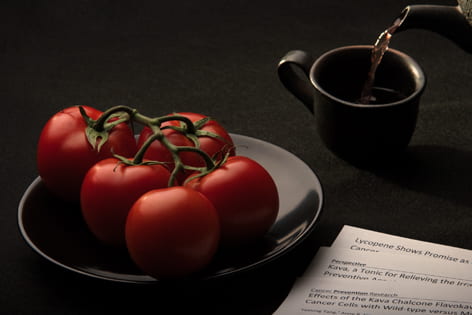The quest for cancer-fighting superfoods
UC Irvine urologic researchers are leading the effort to see how – or if – natural compounds in such foods as tomatoes and kava work in the human body to prevent or treat prostate and bladder cancers.

With a zeal equivalent to the medieval search for the Holy Grail, holistic healthcare advocates continue to scour the planet for natural cancer-fighting products.
They have uncovered a kitchen-cabinet’s worth of foods with purported anti-cancer qualities – olive oil, carrots, garlic, red grapes and green tea, to name a few of the better-known. And each new “superfood” is backed by enough anecdotal evidence of its effectiveness to keep it flying off supermarket shelves.
There is, however, little scientific evidence. Researchers at UC Irvine are leading the effort to see how – or if – natural compounds in such foods work in the human body to prevent or treat the deadly disease.
Xiaolin Zi, who joined UCI’s urology department in 2002, is studying the effects of kava, a plant long-known for its medicinal value, and tomatoes, the superfood du jour, on bladder and prostate cancers.
The kava connection
“Cigarette smoking is a leading cause of bladder cancer, but in the western Pacific islands, where kava is plentiful, the incidence of cancer is low despite high smoking rates,” Zi says. “What I’ve been investigating is how kava compounds can prevent bladder cancer in smokers.”
He has discovered that kava compounds called flavokawains stop bladder tumor growth in cell cultures and animal studies, and he believes they hold hope for staving off bladder cancer in humans.
“The majority of bladder and prostate cancers occur after age 65. Any agents that can delay the onset of cancer are highly beneficial,” Zi says. “For older people, being cancer-free for years longer dramatically improves quality of life.”
The lycopene boost
Lycopene – an antioxidant that occurs naturally in tomatoes and other red fruits and vegetables – is receiving worldwide attention for its possible health benefits. As a cancer fighter, its record is mixed, Zi says, but he has found it to be a promising supplement for prostate cancer chemotherapy.
Men with hormone-refractory prostate cancer – which does not respond or has stopped responding to treatment that lowers or eliminates male hormones in the body – have few therapeutic options. Some receive chemotherapy with docetaxel, one of the most effective drugs available for prostate cancer, but this typically extends survival by only a few months.
“Any agent that could enhance the effect of docetaxel would be a significant improvement,” says Zi, who is affiliated with UCI’s Chao Family Comprehensive Cancer Center.
In recent studies funded by the National Cancer Institute, Zi discovered that lycopene suppressed the growth of certain cells associated with hormone-refractory prostate cancer. And in a mouse model of prostate cancer, he and his colleagues found that adding lycopene to docetaxel treatments increased anti-tumor efficacy by 36 percent.
Based on these results, Zi is helping develop a clinical trial on men with hormone-refractory prostate cancer.
“Although there are not yet a lot of studies showing the cancer-fighting effectiveness of natural treatments, many cancer patients are using them,” he says. “More studies are needed to find out if these natural supplements work, and in what circumstances people should use them. There is a lot of exciting potential is this area of research.”
Complementing Zi’s work, the Chao Cancer Center recently started an integrative oncology program to determine the effectiveness of dietary and lifestyle therapies in cancer prevention and care.